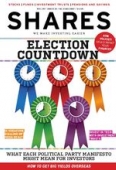Archived article
Please note that tax, investment, pension and ISA rules can change and the information and any views contained in this article may now be inaccurate.
How fund managers flex muscles with takeovers

It has been a bumper year for takeovers and we’re not even at the halfway point in the calendar year. By April more than $2 trillion worth of company mergers and acquisitions had already been announced across the world.
Research by Dealogic reveals there were 125 deals worth more than $1 billion in the first three months of 2017 alone, while cross-border acquisitions – where a company buys another in a different country – have doubled over the past five years.
‘We are slap bang in the biggest period of M&A I have ever seen, and you can expect more to come,’ says Nick Train, manager of Finsbury Growth & Income Trust (FGT).
Relief that a big deal collapsed
Perhaps the most high profile bid so far in 2017 was the approach of US food giant Kraft for UK consumer products firm Unilever (ULVR).
Train says: ‘Thank goodness that transaction never got anywhere near getting off the ground – people recognised what this dividend machine [Unilever] can do. But the £120bn price ticket put on Unilever shows that nothing is too big.’
What many investors may not realise is that, behind the scenes in these deals, fund managers play a major role.
Having a say in accepting or blocking bids
Investment funds, particularly those which invest in smaller companies, can hold large stakes in companies which find themselves the target of a takeover bid; and the managers of these funds can be hugely influential in determining whether or not a deal goes ahead.
Gervais Williams, fund manager of Miton UK Smaller Companies (GB00B8DHL556), says: ‘We have five or ten per cent stakes in some companies so they will involve us in decisions.
‘A fund manager has a different perspective than the management of a business – they are looking at market trends, company valuations and changes in the sector, and when you piece all of those things together you can get a true picture of what’s best for everyone. A takeover is a major event and it’s important to get it right.’
A recent tussle in which he has been involved was the bid for aerial platform specialist Lavendon. The Leicester-based firm found itself the subject of a bidding war at the end of 2016 when an offer of 200p a share was made for the business, whose shares were trading at 139p at the time.
Williams says: ‘There had been some earnings disappointments but growth was starting to come through and its future prospects looked good. We didn’t feel that offer was particularly attractive.’
Lavendon’s management team decided to hold out, and a takeover was eventually agreed at 270p a share.
Having a valuable voice
Alastair Gunn, fund manager of Jupiter Growth and Income (GB0001577351), is also keen to have his say in acquisition deals. ‘There have been times where we have been in conflict with management teams,’ he says.
Gunn was disappointed that Pfizer’s bid for AstraZeneca (AZN) in 2014 did not go ahead. He says: ‘We thought the price being offered was attractive and should have been put to shareholders and it was blocked.’ While he remains an investor in the latter, since the disagreement he has sold some of his shares.
Meanwhile, he has sold all of his shares in Sky (SKY) since its takeover by Fox was announced in December 2016. ‘I felt it was surprising that more people didn’t come out against that deal being too low. But we were minority investors – Fox already owned 39 per cent of Sky – so in that instance we can’t do much,’ he says.
Deal failure can be good news
Not all takeover offers end in disappointment, however. Gunn was pleased when housebuilder Galliford Try (GFRD) abandoned a bid for rival Bovis Homes (BVS).
Shareholders argued that the fundamentals of the industry were strong and that there was enough organic growth in the sector that an acquisition was unnecessary. ‘It was a good example of management listening to shareholders,’ says Gunn.
Andrew Millington, head of equities at Standard Life Investments, is a major investor in engineering firm WS Atkins (ATK), which is currently the subject of a £2bn takeover bid by Canadian rival SNC.
He says: ‘At the moment we are comfortable with the bid, though we haven’t given an irrevocable agreement to vote in favour.
‘It’s an example of a company and management team we really like, where we have already made good money as shareholders and the bid is the icing on the cake.’
Taking a longer term view
Millington is not always so amenable to acquisitions. When engineering business Tomkins – in which he had a 3% stake in – was bought in 2010, the fund manager voted against the offer.
He says: ‘We thought it was in the early stage of recovery and the bid didn’t reflect the ultimate value of the business. I think if we had have held on we would have made considerably more than 325p a share.’
When a share price shoots up after a company has received an offer, it can be tempting to take the money and run but fund managers are looking at the long-term prospects of the business.
A fund manager may not always get their way, but they can at least bring a different view to the negotiation table.
Williams at Miton concludes: ‘There will be more and more merger and acquisition bids to come but the point of fund management is that it’s not just about making money, we have to be socially useful too.’
Important information:
These articles are provided by Shares magazine which is published by AJ Bell Media, a part of AJ Bell. Shares is not written by AJ Bell.
Shares is provided for your general information and use and is not a personal recommendation to invest. It is not intended to be relied upon by you in making or not making any investment decisions. The investments referred to in these articles will not be suitable for all investors. If in doubt please seek appropriate independent financial advice.
Investors acting on the information in these articles do so at their own risk and AJ Bell Media and its staff do not accept liability for losses suffered by investors as a result of their investment decisions.

 magazine
magazine









